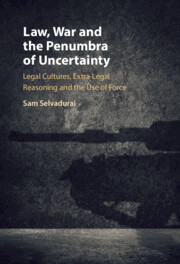Book contents
- Praise for Law, War and the Penumbra of Uncertainty
- Law, War and the Penumbra of Uncertainty
- Law, War and the Penumbra of Uncertainty
- Copyright page
- Contents
- Figures
- Acknowledgements
- 1 Introduction
- Part I Varieties of Uncertainty in the Jus Ad Bellum
- Part II The International Court of Justice, UK-Based Lawyers and the Jus Ad Bellum
- Part III Managing Uncertainty: Reconciling Legal and Extra-legal Reasoning
- 6 Legal Risk, Strategic Assessment, Forecasting and the Jus Ad Bellum
- 7 Uncertainty, Risk Management and Duty to the Law
- 8 Conclusion: Competing Normative Cultures of War
- Bibliography
- Index
6 - Legal Risk, Strategic Assessment, Forecasting and the Jus Ad Bellum
from Part III - Managing Uncertainty: Reconciling Legal and Extra-legal Reasoning
Published online by Cambridge University Press: 31 March 2022
- Praise for Law, War and the Penumbra of Uncertainty
- Law, War and the Penumbra of Uncertainty
- Law, War and the Penumbra of Uncertainty
- Copyright page
- Contents
- Figures
- Acknowledgements
- 1 Introduction
- Part I Varieties of Uncertainty in the Jus Ad Bellum
- Part II The International Court of Justice, UK-Based Lawyers and the Jus Ad Bellum
- Part III Managing Uncertainty: Reconciling Legal and Extra-legal Reasoning
- 6 Legal Risk, Strategic Assessment, Forecasting and the Jus Ad Bellum
- 7 Uncertainty, Risk Management and Duty to the Law
- 8 Conclusion: Competing Normative Cultures of War
- Bibliography
- Index
Summary
Chapter 6 considers how insights from legal risk management, international humanitarian law, strategic intelligence analysis and forecasting might help manage uncertainty and extra-legal biases in the jus ad bellum. The chapter proposes a framework drawing on these fields, using legal and extra-legal expertise to describe the legal and factual context, competing legal theories justifying or prohibiting force, multiple possible interpretations of current facts and future consequences of using or not using force and potential risks that any legal theory is challenged or disproven, and recommending whether to accept these risks and use force, take steps to reduce risks, or not to use force where these risks are too severe. The chapter applies this framework to the Kosovo and Afghanistan interventions, showing that the framework as applied by this author recommends more cautious decisions than those actually taken. The chapter considers how such a framework might have affected UK legal advice on the 2003 Iraq intervention. The chapter concludes that the framework may help address uncertainty and extra-legal intuitions, but does not eliminate the need for judgement, and raises significant normative questions.
Keywords
- Type
- Chapter
- Information
- Law, War and the Penumbra of UncertaintyLegal Cultures, Extra-legal Reasoning and the Use of Force, pp. 217 - 263Publisher: Cambridge University PressPrint publication year: 2022



